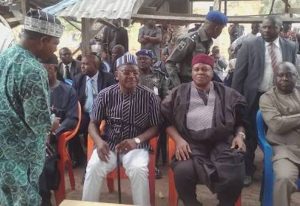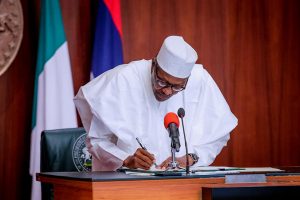“The deployment of security men can only provide a temporary solution. …The long term and lasting solution to this deep-seated antagonistic relationship between the warring factions depend on the willingness of those involved to listen to reason and give peace a chance”

The Benue and Taraba state governors
The above quotation is from President Muhammadu Buhari’s intervention on the current, disturbing phase of the Jukun/Tiv violence in Taraba State. The first point in the above quotation is the president privileging the willingness of those involved to listen to each other as the way out. That’s vital, irrespective of whichever angle one sees it from.
The second point in the quotation from the president’s statement is also the truism that security men can only provide a temporary solution. On this too, the president is correct. The idea that peace is in the human minds is no longer a discredited analogy. There is no formula for peace beyond inter-group conversation and self-understanding. It is only from such conversation that conflict parties break down barriers and enemy images of each other.
Competition for land does not bring about hatred and violence. It is the narrative of the competition that brings hatred and the violence that follows. It is in narratives that the ‘we’ versus ‘they’ binary surfaces and it is the ‘we’ versus ‘them’ binary that embodies violence. The only way, therefore, to undo such binarism is for conflict parties to talk.

President Buhari
The problem with talking is the difficulty of doing so once there have been killings on both sides based on a long history of hatred. This is the third merit in the president’s intervention in terms of him putting the task on specific people who will make talking possible, specifically the two leading cultural symbols in this context – the Aku Uka of Wukari and the Tor Tiv. At a moment of extreme bad blood as in Tiv/Jukun relations now, only such cultural symbols can make talking possible. If Samuel Huntington is right, culture is that realm that modernity has been unable to conquer. Hence, the symbolic primacy of traditional rulers across Nigeria! That is to say that the traditional authority will find it easier to make a conversation in this matter possible and productive than the Nigerian State although not without the state. Only the state has the monopoly of legitimate use of violence and military and police presence remains indispensable even as the peace process goes on.
The assumption is that this point will sink and bloodletting by two ethnic groups with strong sense of ethnic self would stop. It is doable!




























